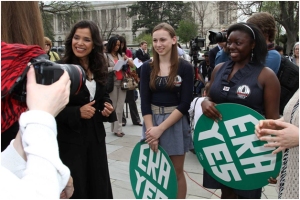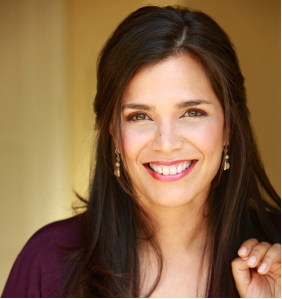By Caroline Dobuzinskis
This month is Women’s History Month and yesterday marked a milestone: March 22 marked the 40th anniversary of when the Equal Rights Amendment (ERA) first passed the Senate and was sent to the states for ratification. ERA is a proposed Constitution Amendment—first written in 1923 by suffrage leader Alice Paul—that would affirm the equal treatment of women and would prohibit discrimination based on gender.
IWPR interviewed activist and filmmaker, Kamala Lopez, who has made informing citizens about the ERA part of her mission as the founder and president of Heroica Films, Inc. Lopez is also the Founding Director of GlobalGirl Media’s Los Angeles Bureau , is the recipient of the 2011 Women of Courage Award from the National Women’s Political Caucus, and was recognized in 2012 as the 21 Leaders for the 21st Century Award by Women’s eNews.
Lopez, who has been acting since the age of seven, came to activism on the ERA through almost happenstance circumstances: while promoting her film about the first Congresswoman, Jeannette Rankin, she was shocked to learn that gender equality had not been ratified under the Constitution. In 2011, she connected with Congresswoman Carolyn Maloney (D-NY), who is also the lead House sponsor of a bill reintroducing the ERA. Maloney asked Lopez to help her create a campaign to build public support for bringing ERA up for a vote, which hasn’t happened since 1982.
A brief history on the ERA: First introduced in 1923, the ERA passed the U.S. Senate and then the House of Representatives and was sent to the states for ratification on March 22, 1972. Immediately after its initial passage in 1972, the ERA gained 22 ratifications, but the momentum quickly slowed as opposition formed. In 1976, no states ratified the amendment and, so far, only 35 of the necessary 38 states have ratified. The ERA has been subsequently reintroduced in every session of Congress since the year the ratification deadline passed in 1982. Each time it has been reintroduced without a ratification deadline. The 2011 Walmart v. Duke sexual discrimination case shed new light on the ERA.
Lopez’s production company launched a multimedia campaign called the ERA Education Project that includes a website with news and information, as well as several PSAs (like this compelling one). “The problem with talking about the ERA is that people don’t connect it to their lives right now,” said Lopez. “There is a real lack of urgency about it.” Lopez has upcoming projects aiming to get women “on the offense” on the issue of equality under the ERA.
Lopez spoke with IWPR about her start in filmmaking, her inspiration for activism, and her upcoming projects. Here is an excerpt from the interview.
IWPR: Tell me more about your background and how your experience lent itself to your current role as a filmmaker?
Lopez: I moved to Los Angeles after [graduating from Yale with a bachelor’s in Philosophy and Theatre Studies] to pursue acting. After several years as a working film and TV actor, I came to the realization that if I didn’t want to remain in a powerless position, I was going to have to work on new skills and attempt to create and produce material.
I produced my first short film in 1995—the same year I formed my production company Heroica Films. Since then I have produced many short films, internet media campaigns, and the feature film “A Single Woman” about the life of first Congresswoman and pacifist, Jeannette Rankin.
I am in the process of putting together a documentary about the state of women’s rights in the United States and what we can all do to change the situation. I plan to cross the country talking to women about the issues that affect them and educating them on the need for ERA.
IWPR: What inspired you to start the ERA Education Project?
Lopez: Whilst doing women’s history research to incorporate into the film [about Congresswoman Jeannette Rankin] I learned that—although Alice Paul had written the ERA soon after women achieved the vote and believed this was the next necessary step towards women’s full participation in our society—it had not been ratified. That really stopped me dead in my tracks. It was as if a very large invisible elephant in the room had briefly become visible.
When I got back from DC [after showing the film, “A Single Woman”] I started doing some cursory research into the situation and was truly and finally aghast at what I perceive to be one of the greatest injustices of all time. And one that I believe is simply in place because people, like myself, are not aware of it.

Lopez with several interns from the National Organization for Women (NOW) at a press conference to mark the 40th anniversary of the ERA on March 22, 2012, in Washington, DC.
IWPR: What do you think that passing the ERA would achieve for women?
Lopez: Passing the ERA would do multiple things for women. Primarily, it would enforce equality in wages, health insurance, pension and Social Security…I believe that acknowledging women’s fully equal status would have a quantifiable effect on very serious issues that are undermining and injuring women every day. Issues such as international policy and the ratification of the [Committee on the Elimination of Discrimination Against Women], domestic violence and crime, rape, healthcare and reproductive rights, cultural bias, media exploitation and denigration, lack of childcare, maternal rights, religious oppression and discrimination within the military, among others.
Caroline Dobuzinskis is the Communications Manager with the Institute for Women’s Policy Research.
To view more of IWPR’s research, visit IWPR.org
About the author
- IWPR
- IWPR
- IWPR
- IWPR


